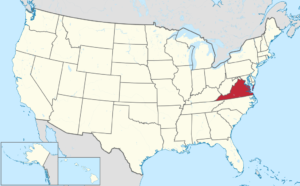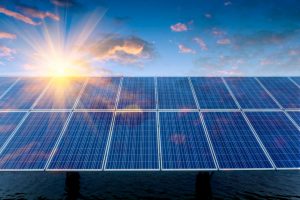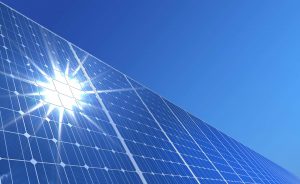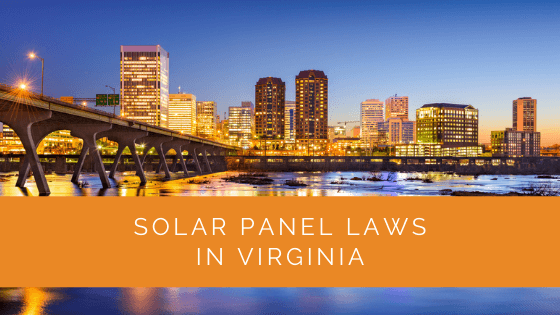 Due to recent climate changes and global warming, governments, NGOs, and everyone are sensitizing the world to adopt green practices and clean energy. Clean energy is derived from renewable sources such as solar and wind.
Due to recent climate changes and global warming, governments, NGOs, and everyone are sensitizing the world to adopt green practices and clean energy. Clean energy is derived from renewable sources such as solar and wind.
Homes and utility providers are being requested to stop burning fossil fuels to create energy and start generating clean electricity. To switch to solar power, you must be familiar with local laws.
Lawmakers passed the ‘Virginia Clean Economy Act (VCEA) that regulates the installation of solar panels in Virginia by consumers and utility providers. Here are some of the laws concerning solar panels in Virginia.
Contents
- 1 Key Takeaways
- 2 Net Metering
- 3 Financial Incentives
- 4 Permits to Have Larger Systems
- 5 Homeowners Association Limits
- 6 Community Solar
- 7 Other Legislations
- 8 Case Study: Residential Solar Panel Installation in Virginia
- 9 Expert Insights From Our Solar Panel Installers About Solar Panel Laws in Virginia
- 10 Experience Solar Excellence with Us!
Key Takeaways
- Virginia allows utility providers to offer net metering, enabling customers to receive credits for excess solar power generation and compensation for accumulated solar credits, resulting in savings.
- Various incentives, such as the Investment Tax Incentive (ITC) and tax exemptions for solar installations, encourage consumers to switch to solar energy. At the same time, third-party mechanisms facilitate solar adoption for non-profit organizations.
- The law increases the size limits for solar panel installations in Virginia and protects consumers’ ability to go solar by limiting Homeowners Associations’ ability to impose unreasonable restrictions. Community solar initiatives allow multifamily buildings to share solar systems, promoting widespread solar access.
Net Metering
Virginia laws allow utility providers to provide net metering to customers who have installed their solar panels in their homes. Customers receive solar credits for any power generated that is not consumed and adopted by the grid. Any excesses generated in a month are carried over to the subsequent month.
Customers also receive compensation for solar credits that they have accumulated after 12 months. In turn, this generates savings for consumers.
Financial Incentives
Consumers all over the state are switching to solar and are generating savings as installation costs fall, coupled with incentives and rebates. The Investment Tax Incentive (ITC) will reduce the cost of buying a solar system for your household by 30%. This incentive is only for those who buy a whole solar system array at one go, using cash or a loan.
Installing a solar panel and system will likely increase your home value. This means you have to pay extra tax. Virginia has passed laws that exempt solar from being taxed, either wholly or partially waivered. However, this does not apply to all localities; it’s best to consult your local authority first.
VCEA has also implemented a financial mechanism known as a third party. This means that residential houses, businesses, and organizations can host a solar system on their property without paying the initial upfront cost for a system. This will enable many non-profit organizations to take on solar power.
Taking advantage of the federal solar tax incentives and the fact that they don’t pay tax, these organizations can set up systems in residential houses and host the systems from there. The host site will buy electricity at half the cost they were buying from their utility providers. Both parties will then benefit and receive massive savings from this type of collaboration.

Permits to Have Larger Systems
The new law has increased the total size of solar panels that residents and commercial entities can build in Virginia. Commercial entities can now build solar systems that generate 3MW from a limit of 1MW. Residential houses can build 25kW systems from a limit of 20kW.
The new law allows consumers to generate up to 150% of their annual electricity usage. This law is only applicable in Dominion territory. This means that consumers have the opportunity to plan to buy an electric car because their solar system can handle the load. This is a major development towards a future using clean energy.
The law also increases the size that can be owned using third-party ownership, from a limit of 3MW to 40MW in the Appalachian power territory.
In the dominion territory, the limit was 50MW, but the limit was reached, and it was extended to 500MW for customers. And another 500MW for non-jurisdiction customers like schools and governments.
Homeowners Association Limits
Virginia laws protect consumers’ ability to go solar. The law does not allow any Homeowners association to restrict anyone from going solar. However, this has a limit, as the law has allowed the Homeowners Association to have ‘reasonable restrictions’ for solar installation.
In the past, the reasonable restrictions rule has been used by HOAs to create unnecessary restrictions. For example, the restriction that solar panels should be placed on the roof’s rear side, irrespective of where the sun shines (which resulted in denied permits and blocked projects).
Now, the law states that for a restriction to be reasonable, it must not increase the installation cost by 5% or affect energy production by 10% of expected production.
The system owner must provide the documentation that an independent solar panel design specialist has done to ascertain that the restriction is unreasonable.
Suppose you want to install solar panels in your house or belong to a Homeowners Association. In that case, it’s better to be acquainted with the reasonable restrictions for your respective association.
Community Solar
This law has allowed multifamily buildings and villas to share one on-site solar system. This means that apartments with many living in them can pool funds to finance a solar array to support every individual’s needs. This will lead to robust development and solar access to all customers for all classes.

Other Legislations
The VCEA authorizes the DMME to provide statewide financial assistance and programs for investments in clean energy, corporate solar, and stormwater management.
This will allow Commercial Property Assessed Clean Energy (C-PACE) to provide low-interest financing to remote areas around the state where local authorities have not developed such programs.
It authorizes on-billing financing of renewable energy and energy efficiency by electric cooperatives. This program will allow customers to pay for the costs incurred through the savings that solar improvements will provide.
The law has also fixed crowdfunding financial approaches’ obstacles and has repealed the sunset date.
Case Study: Residential Solar Panel Installation in Virginia
Background
We were approached by a homeowner in Virginia interested in reducing their carbon footprint and lowering their electricity bills through solar energy. The homeowner had heard about the recent legislative changes in Virginia, specifically the Virginia Clean Economy Act (VCEA), and was eager to take advantage of the new opportunities for solar energy adoption.
Project Overview
Our objective was to design and install a solar panel system that maximized energy production while complying with Virginia’s solar panel laws. The project aimed to leverage the benefits of net metering, financial incentives, and the increased system size limits provided by the VCEA.
Implementation
We began with a detailed site assessment to determine the optimal placement and size of the solar array. Given the new law allowing residential systems up to 25kW, we proposed a 20kW system, which would comfortably cover the homeowner’s current energy needs and provide room for future expansion.
Permitting and Design:
- We handled all necessary permits and approvals, ensuring compliance with local regulations and Homeowners Association (HOA) guidelines.
- Our design considered the HOA’s ‘reasonable restrictions’, ensuring that the placement did not increase installation costs by more than 5% or decrease energy production by more than 10%.
Installation:
- The installation included high-efficiency solar panels, an inverter, and a battery storage system.
- We integrated the system with the home’s existing electrical infrastructure, ensuring seamless energy transition.
Net Metering Setup:
- We coordinated with the local utility provider to set up net metering. This setup allowed the homeowner to receive credits for excess power generated and fed back into the grid.
- The net metering system was configured to track energy production and usage, enabling the homeowner to monitor their savings and energy consumption.
Results
Upon completion, the 20kW system immediately began generating significant amounts of clean energy. The homeowner experienced a noticeable reduction in electricity bills due to the net metering credits. Additionally, the system’s battery storage provided backup power during outages, enhancing energy security.
Financial Benefits:
- The homeowner benefited from the 30% federal Investment Tax Credit (ITC), significantly reducing the initial investment cost.
- Local tax exemptions further alleviated the financial burden, making the transition to solar energy more affordable.
Environmental Impact:
- The solar panel system reduced the home’s carbon footprint, contributing to the homeowner’s goal of environmental stewardship.
- By utilizing renewable energy, the household decreased reliance on fossil fuels, aligning with broader state and national clean energy goals.
Summary
This project exemplifies the positive impact of Virginia’s solar panel laws on residential solar adoption. The VCEA, coupled with financial incentives and net metering, enabled our client to install a robust solar energy system that not only provided immediate financial benefits but also ensured long-term energy sustainability. Solar Panels Network USA is proud to support homeowners in navigating these regulations and achieving their renewable energy goals.
Expert Insights From Our Solar Panel Installers About Solar Panel Laws in Virginia
One of the key advantages for our customers in Virginia is the net metering policy. This policy allows homeowners to feed surplus solar energy back into the grid, effectively lowering their energy bills. It’s a game-changer for maximizing the return on investment for solar installations.
Lead Solar Installer
The Virginia Clean Economy Act (VCEA) has significantly streamlined the process for larger solar installations. Now, residential customers can install up to 25kW systems, which is great for those planning future expansions, like adding electric vehicles to their household.
Senior Solar Technician
The law limiting Homeowners Associations from imposing unreasonable restrictions on solar panel installations is a big win for property owners. It ensures that solar systems can be optimally placed for maximum efficiency without unnecessary hindrance.
Solar Installation Manager
Experience Solar Excellence with Us!
Trust in Solar Panels Network USA, where our seasoned experts deliver top-quality solar solutions for homes and businesses nationwide. With a legacy of countless successful installations and a commitment to sustainable energy, we’re your reliable partner in the solar journey. Ready for a brighter, eco-friendly future? Call us now at (855) 427-0058 and harness the power of the sun!
Map image by Wikimedia Commons User: TUBS / CC-BY-SA-3.0
About the Author
Solar Panels Network USA stands at the forefront of solar energy solutions, driven by a team of seasoned solar engineers and energy consultants. With over decades of experience in delivering high-quality solar installations and maintenance, we are committed to promoting sustainable energy through customer-centric, tailored solutions. Our articles reflect this commitment, crafted collaboratively by experts to provide accurate, up-to-date insights into solar technology, ensuring our readers are well-informed and empowered in their solar energy decisions.

